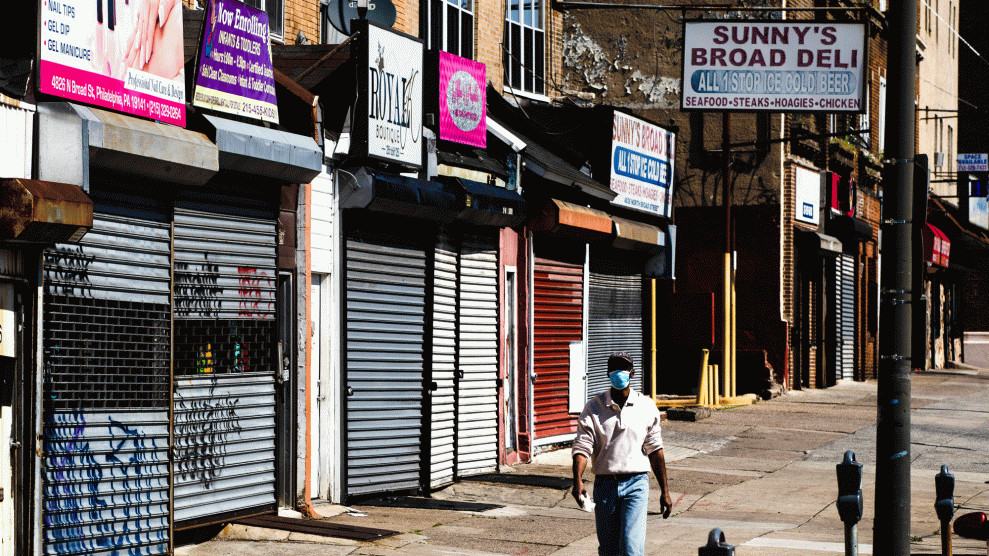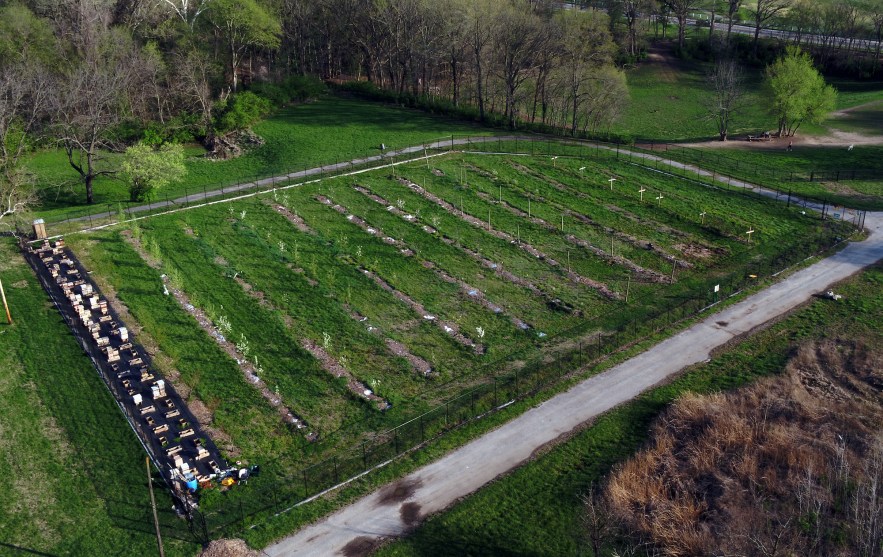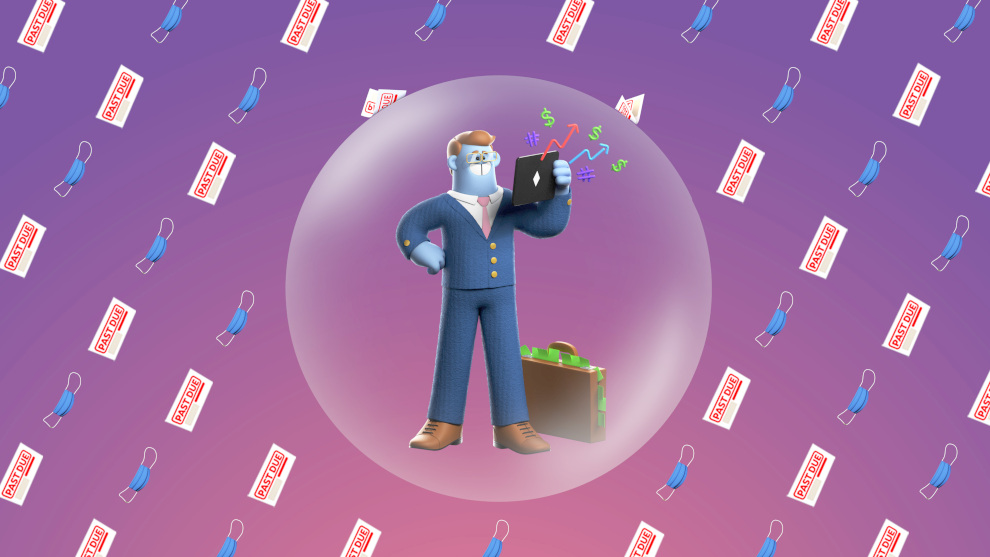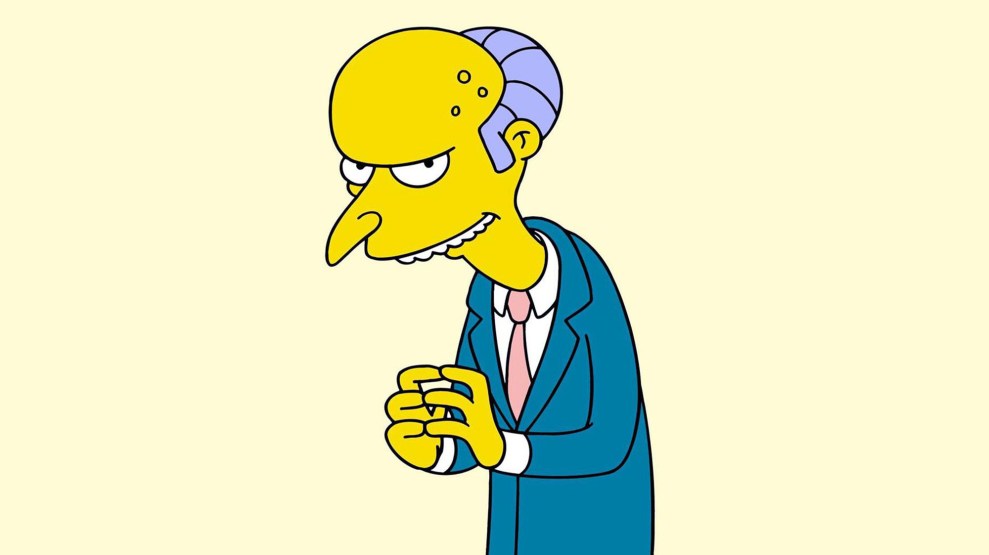
A Philadelphia street in May 2020.Matt Rourke/AP
The Paycheck Protection Program was supposed to help small businesses struggling from the crippling financial effects of the coronavirus pandemic. But the benefits, as with other government responses to the crisis, flowed disproportionately to white communities.
A new investigation from Reveal, which analyzed the distribution of more than five million PPP loans, found that the program was plagued with widespread racial disparities. The findings show a persistence of the type of structural racism—exemplified by the racial covenants and redlining policies of 20th century—that has long prevented communities of color from thriving. Reveal found, for example, that in the “vast majority” of major metropolitan regions, businesses in majority-white neighborhoods were approved for loans at much higher rates than those in majority Latino, Black, or Asian ones. According to the investigation, published in partnership with the Los Angeles Times:
Los Angeles had some of the worst [disparities] in the nation. Although communities of color were hit far harder by COVID-19, businesses in majority-White areas received loans at twice the rate that majority-Latinx tracts received, one and a half times the rate of businesses in majority-Black areas and 1.2 times the rate in Asian areas.
The New York metro area, which includes Newark and Jersey City in New Jersey, saw equally striking disparities, with White areas receiving loans at twice the rate of Latinx areas, 1.8 times the rate for Black areas and 1.2 times the rate in Asian areas.
In other metro areas, including Dallas, San Francisco, San Diego, Las Vegas and Phoenix, businesses in majority-White areas also received loans at about twice the rate as those in majority-Latinx areas.
The first batch of loans, totaling $349 billion, went out last spring, days after Congress passed the CARES Act. But amid the hasty rollout, a lack of federal guidance meant that, as Reveal put it, “any obstacle, such as missing paperwork or a lack of an existing relationship with a bank, risked leaving a business last in line.”
In early April, Malik Muhammad, the owner of a Los Angeles bookstore specializing in African American literature, reached out to Wells Fargo—a bank that “effectively starved communities of color of PPP money,” Reveal reports. Muhammad heard nothing about his loan request for weeks. In early June, he received a form letter: “We cannot confirm that all applications will be submitted and processed by the SBA before the funds are depleted, and we anticipate that demand will exceed available funding.” He never received any follow-up communication from Wells Fargo, though he later managed to get a small loan from Square. “I know we’re not big business, but we deserve a call,” he said.
The CARES Act had instructed the federal Small Business Administration to prioritize “socially and economically disadvantaged individuals,” according to an October 2020 congressional subcommittee report cited by Reveal. But the SBA, the Treasury Department, and the big banks administering the PPP loans ignored that guidance. In fact, the subcommittee found, Treasury had privately encouraged the banks to limit their initial loans to existing customers, excluding many minority and women-owned businesses.
None of the lenders the subcommittee interviewed recalled any guidance from the Trump administration on how to prioritize underserved communities, and several set up lending programs in which large commercial clients enjoyed a “separate, faster process.” In some cases, PPP loans for wealthier clients were processed at twice the speed of loans for truly needy small businesses.
Reveal had reported back in April 2020 that the owners of small businesses in Republican states without stay-at-home orders were more likely to have gotten PPP loans than those in Democratic states where COVID hit hard first. In December, the New York Times and Washington Post both reported that the majority of PPP money had flowed to big businesses, including dozens of national chains, many publicly traded. The same month, when Congress passed its second COVID relief package, the legislation included a bipartisan provision that helped all PPP recipients, but was most beneficial for the companies with the biggest loans, resulting in an estimated $120 billion tax break for America’s richest business owners.
The botched rollout of a program supposedly intended to help small businesses and their employees has proved devastating for many—particularly Black owners, who are far more likely to be sole proprietors. Reveal cites a study by the Federal Reserve Bank of New York, which found that from February through April 2020, the number of active businesses plummeted by 22 percent, but the number of Black and Latino businesses dropped by 41 percent and 32 percent, respectively.















